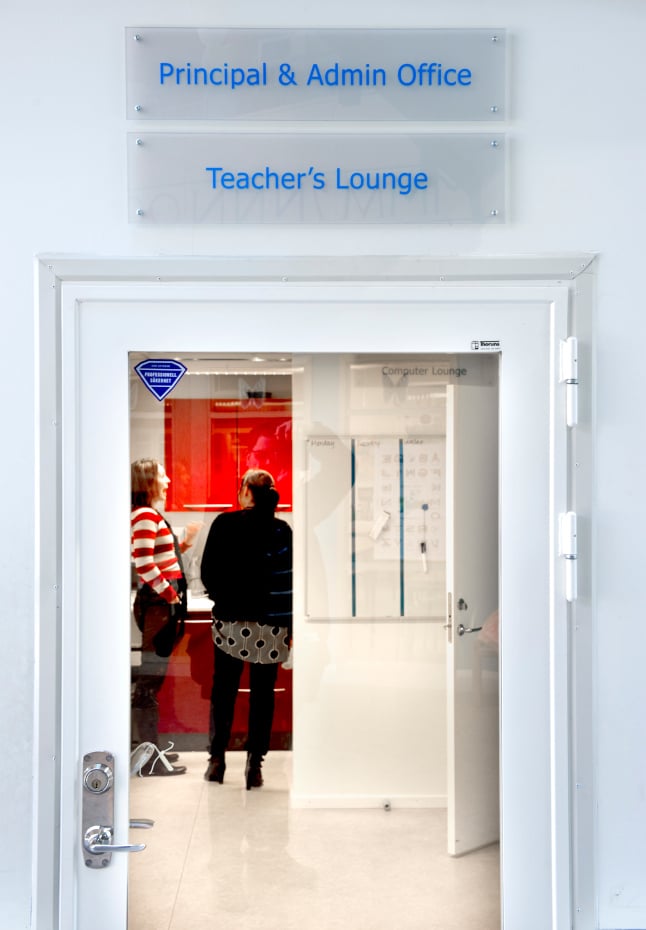What's it like to work as a foreign teacher at Swedish free school chain IES?

Internationella Engelska Skolan, the free school chain that made its founder nearly a billion kronor, pays its qualified foreign teachers low wages and gives them duties they have not trained for, several teachers who work for the chain have told The Local.
Six foreign teachers who had worked at or were still working for schools run by Internationella Engelska Skolan (International English School – IES) spoke to The Local about significant discrepancies in salaries between Swedish teachers with local qualifications and the foreign teachers who form a large proportion of the company's staff.
They also said that even as new graduates, they were asked to teach classes of as many as 32 pupils single-handed, and were also asked to teach subjects and age groups they had not been trained for. Two said they had been given multiple administrative jobs without being given extra time to do them.
"Internationals are severely underpaid in comparison to Swedish teachers. That's not a secret," said a teacher at an IES school in southern Sweden who is leaving their school at the end of this term. "I started on 25,000 (approximately $2,750), and my friend started on 26,000. The pay is super unfair."
On the employee review site Glassdoor, there are more than 20 reviews complaining of "terrible pay" at IES. The average teacher's salary in Sweden is between 30,000 and 40,000 kronor, although it varies a lot.
With 48 schools in Sweden, IES is one of Sweden's largest chains of private "free schools", which are funded by the government but operated independently, often by profit-making companies.
The schools are facing renewed scrutiny in Sweden as the ruling Social Democrats prepare to campaign in the run-up to next year's election on a pledge to forbid the owners of free schools from taking out profits and to force them to use the same queuing system for admissions as municipal schools.
IES came into the spotlight just before Christmas after the chain's American founder Barbara Bergström gave a combative interview in the Dagens Nyheter newspaper, dismissing criticism of her schools as "bullshit".
She made 918 million kronor when she sold the chain to the Boston-based equity fund TA Associates in 2012. The fund listed the company on the Stockholm Stock Exchange in 2016 and it was then taken private again last year by the Berlin-based Paradigm Capital. Bergström's foundation remains a major owner with 18 percent of the shares.

Internationella Engelska Skolan's founder Barbara Bergström. Photo: Malin Hoelstad/SvD/TT
'They expect a revolving door'
The school tends to hire teachers directly at university careers fairs back in their home countries. About half of the group's 2,300 teachers are educated in English-speaking countries, with 14 percent from the UK and Ireland, 11 percent from the US, 9 percent from Canada and 22 percent from the rest of the world. Some 42 percent of teachers have English as their first language.
As these hires do not know how the Swedish system works, they are not likely to push hard for a better salary, several teachers argued. The school then replaces these teachers with new fresh graduates once they tire of the large class sizes and low salaries.
"As an international, you're never told that you can negotiate your pay ever during the meeting. Never," the teacher based in southern Sweden said. "What they're expecting is a revolving door. They're expecting people to leave. And that's how they can get away with paying people so low."
Another teacher, who worked in a senior role at one of the schools earlier this decade, confirmed the pay discrepancy between local and international hires.
"I've seen all the salaries of all the foreign teachers, and they massively underpay the foreign teachers – you're talking 10,000 kronor differences for people with the same experience," the teacher said.
EDITOR'S PICKS:
The Swedish Teachers' Union (Lärarförbundet) said they were aware of the problem.
"There is a significant number of teachers with temporary employment and very low wages in the company, who are in a weak negotiation position compared to the Swedish teachers," Johanna Jaara Åstrand, the union's chairperson, told The Local. "The situation is extremely unsatisfying."
But she said that because the collective bargaining agreement between the municipalities, private operators, and non-profit organisations which run Sweden's schools has not set specific wage levels since 1995, it was difficult to challenge IES's low starting wages, once foreign teachers have agreed to them.
"This model has worked well for teachers in Sweden, as a result of the short supply and high demand for teachers during the past 20 years," said Jaara Åstrand.
"A lot of teachers with Swedish teaching licences were able to find other employers who valued them more and quit their jobs at IES. The international teachers already at the school do not have the same opportunity. This has led to a huge wage gap," she said.
It is difficult, however, for unions in Sweden to argue that the wage gap is discriminatory, as IES can claim that the pay was set by the free market, and freely agreed to by the teachers. Foreign citizens are also not in themselves a group protected by anti-discrimination legislation.
Younger teaching staff
IES told The Local that its starting salaries for new international hires had increased in the last few years but put the low average down to the fact that 66 percent of IES teachers are under 40, compared with 32 percent of teachers in Sweden on average.
"IES teaching staff are younger than the Swedish national average and a significant part of our international teachers come to Sweden straight from university, all of which is reflected in their salary," said Robin Kirk Johansson, head of education at IES. "When looking at national salary statistics, we are on par for most age groups."
All IES contracts follow national and local union agreements, she added, including annual salary revision. The company has signed a collective bargaining agreement through the Almega employers' organisation.

Teachers in Sweden typically earn 30,000 to 40,000 kronor. Photo: Lars Pehrson/SvD/TT
Jaara Åstrand said that as her union found it difficult to challenge IES practices in employment courts, it had concentrated on trying to inform graduate teachers abroad of the need to negotiate a decent starting wage.
People with no previous knowledge of the Swedish labour market are often unaware of just how crucial it is compared to many other countries to negotiate a good entry salary, with future annual raises usually being limited to small percentage increases negotiated by the unions. Once in Sweden, the only way they can substantially boost their earnings is to move to a new employer.
The Swedish Teachers' Union has set up a web page, informing potential international recruits of salaries in Sweden.
"The right moment to reach an agreement regarding your salary is before signing your employment contract," the website warns applicants. "Your initial salary with an employer is crucial for your future salary development with that employer."
Stress, overwork, and poor mental health
It is not just low pay.
Several teachers told The Local that they had too many responsibilities for the hours they were paid to work. The senior teacher who no longer works for the group said that when they arrived at their school, they discovered they had been given what would have been four separate jobs at the international schools where they had worked previously.
"There's a lot of hidden duties that you don't know about when you're initially hired," said another teacher at a school in southern Sweden. "They don't go over the details of the mentor programme, which is a really big part of IES culture, and all of the in-depth meetings that you have with students, parents, the school team, and your department."
"Things get swept under the rug initially, and then after you've been in it for a while, you realise, 'oh, there's a lot more work than they initially told us'."
A teacher at a school in Stockholm said they were made to teach maths and home economics at primary school level, when they had trained in the US to be a secondary school teacher in two completely different subjects.
"The company will throw you into whatever position they need filled," she said. "So I got my qualifications to teach high school students, and I've been teaching primary school students aged nine and ten, which has been fine, but I trained to teach the older students for a reason, and I would like to teach the age groups and the subjects that I actually got qualified to teach."

The Local spoke to six teachers for this article. Photo: Pontus Lundahl/TT
The extra responsibilities take their toll even on the youngest and most enthusiastic teachers.
A survey carried out by the union at one school, whose results were passed to The Local, found that 65 percent of members felt they didn't have enough time to do their jobs properly, a majority felt they had more responsibilities than they were paid for, and a majority said they were working more hours than they were paid for.
As many as 70 percent said they felt "stressed" or "extremely stressed", 60 percent said that the job was "affecting their mental health", 40 percent said they felt "burned out", and 34 percent said they were considering leaving the school.
Kirk Johansson, head of education at IES said their headteachers were formally responsible for dealing with complaints from teaching staff, with the support of the central human resources division, although some teachers told The Local no steps had been taken whenever they had raised problems.
"First of all, our staff are very important to us," said Kirk Johansson. "If a formal complaint is lodged, it’s always thoroughly investigated and actions are taken based on that investigation. For serious misconduct in operations, a whistle-blower function is in place. If it is brought to our attention that a personnel matter has been handled in an incorrect way, we would immediately take action to ensure it doesn’t happen again."

IES founder Barbara Bergström receiving Ernst & Young's Entrepreneur Of The Year award in Sweden in 2014. Photo: Maja Suslin/TT
Unions, residency permits, and language problems
Many work contracts in Sweden include a six-month trial period, during which employees have limited employment rights.
"When the union got involved, they said there's not much we can do, because you're on a probation contract for six months," the senior teacher said of a dispute with school management.
As most international recruits, particularly those from the US and Canada, only have residency rights in Sweden as a result of their employment contract with IES, they are also often reluctant to complain.
"You're always like, is this going to risk my job position here? I could have to leave the country because of this," said one of two teachers we spoke to who work in Stockholm.
The senior teacher we spoke to accused the group's management of switching away from English to gloss over difficult issues during the hiring process.
"They present themselves as an international school, but actually it's anything but an international school," the teacher said. "Half of the actual induction was in Swedish. I was like, 'What the hell is this? Why are these sections, these important legal sections, in Swedish?'."

File photo, not linked to the article, of a teacher's lounge at an IES school in Sweden. Photo: Pontus Lundahl/TT
Fast promotions and early responsibilities
One of the teachers based in Stockholm pointed out that for young, ambitious new teachers, there was a positive side to the school's reliance on international teaching graduates, as new graduates at IES get a lot of responsibility very quickly.
"You could be the head of the department in your second year at IES. You could be head of school in your second or third year of IES," she said. "It can be very quick to move high up in your job position, which is actually incredible. Not many schools do that. It's very rare for you to be able to do that so early on in your career."
The downside, however, is that the chain gives responsibility to staff who sometimes lack the experience to cope with it.
For the teachers themselves, this can help get jobs at other schools. "The advantage is more for your next job. So you can say, 'in my second year of teaching, I was already the head of department'," the Stockholm teacher said.
But the quick turnover of teachers, some complained, affected the quality of students' education.
"I think it's important for students to have teachers that are there for them for the long haul. And it's really uncommon in normal schools to have teachers that leave every two to three years," said one of the teachers based in southern Sweden. "It's not fair to those students to have people that they trust, that they rely on for their education, who just leave."
Do you have a story about living and working in Sweden to share with The Local, or more information about working at the IES? Email our editorial team at [email protected].
Comments (4)
See Also
Six foreign teachers who had worked at or were still working for schools run by Internationella Engelska Skolan (International English School – IES) spoke to The Local about significant discrepancies in salaries between Swedish teachers with local qualifications and the foreign teachers who form a large proportion of the company's staff.
They also said that even as new graduates, they were asked to teach classes of as many as 32 pupils single-handed, and were also asked to teach subjects and age groups they had not been trained for. Two said they had been given multiple administrative jobs without being given extra time to do them.
"Internationals are severely underpaid in comparison to Swedish teachers. That's not a secret," said a teacher at an IES school in southern Sweden who is leaving their school at the end of this term. "I started on 25,000 (approximately $2,750), and my friend started on 26,000. The pay is super unfair."
On the employee review site Glassdoor, there are more than 20 reviews complaining of "terrible pay" at IES. The average teacher's salary in Sweden is between 30,000 and 40,000 kronor, although it varies a lot.
With 48 schools in Sweden, IES is one of Sweden's largest chains of private "free schools", which are funded by the government but operated independently, often by profit-making companies.
The schools are facing renewed scrutiny in Sweden as the ruling Social Democrats prepare to campaign in the run-up to next year's election on a pledge to forbid the owners of free schools from taking out profits and to force them to use the same queuing system for admissions as municipal schools.
IES came into the spotlight just before Christmas after the chain's American founder Barbara Bergström gave a combative interview in the Dagens Nyheter newspaper, dismissing criticism of her schools as "bullshit".
She made 918 million kronor when she sold the chain to the Boston-based equity fund TA Associates in 2012. The fund listed the company on the Stockholm Stock Exchange in 2016 and it was then taken private again last year by the Berlin-based Paradigm Capital. Bergström's foundation remains a major owner with 18 percent of the shares.

'They expect a revolving door'
The school tends to hire teachers directly at university careers fairs back in their home countries. About half of the group's 2,300 teachers are educated in English-speaking countries, with 14 percent from the UK and Ireland, 11 percent from the US, 9 percent from Canada and 22 percent from the rest of the world. Some 42 percent of teachers have English as their first language.
As these hires do not know how the Swedish system works, they are not likely to push hard for a better salary, several teachers argued. The school then replaces these teachers with new fresh graduates once they tire of the large class sizes and low salaries.
"As an international, you're never told that you can negotiate your pay ever during the meeting. Never," the teacher based in southern Sweden said. "What they're expecting is a revolving door. They're expecting people to leave. And that's how they can get away with paying people so low."
Another teacher, who worked in a senior role at one of the schools earlier this decade, confirmed the pay discrepancy between local and international hires.
"I've seen all the salaries of all the foreign teachers, and they massively underpay the foreign teachers – you're talking 10,000 kronor differences for people with the same experience," the teacher said.
EDITOR'S PICKS:
The Swedish Teachers' Union (Lärarförbundet) said they were aware of the problem.
"There is a significant number of teachers with temporary employment and very low wages in the company, who are in a weak negotiation position compared to the Swedish teachers," Johanna Jaara Åstrand, the union's chairperson, told The Local. "The situation is extremely unsatisfying."
But she said that because the collective bargaining agreement between the municipalities, private operators, and non-profit organisations which run Sweden's schools has not set specific wage levels since 1995, it was difficult to challenge IES's low starting wages, once foreign teachers have agreed to them.
"This model has worked well for teachers in Sweden, as a result of the short supply and high demand for teachers during the past 20 years," said Jaara Åstrand.
"A lot of teachers with Swedish teaching licences were able to find other employers who valued them more and quit their jobs at IES. The international teachers already at the school do not have the same opportunity. This has led to a huge wage gap," she said.
It is difficult, however, for unions in Sweden to argue that the wage gap is discriminatory, as IES can claim that the pay was set by the free market, and freely agreed to by the teachers. Foreign citizens are also not in themselves a group protected by anti-discrimination legislation.
Younger teaching staff
IES told The Local that its starting salaries for new international hires had increased in the last few years but put the low average down to the fact that 66 percent of IES teachers are under 40, compared with 32 percent of teachers in Sweden on average.
"IES teaching staff are younger than the Swedish national average and a significant part of our international teachers come to Sweden straight from university, all of which is reflected in their salary," said Robin Kirk Johansson, head of education at IES. "When looking at national salary statistics, we are on par for most age groups."
All IES contracts follow national and local union agreements, she added, including annual salary revision. The company has signed a collective bargaining agreement through the Almega employers' organisation.

Jaara Åstrand said that as her union found it difficult to challenge IES practices in employment courts, it had concentrated on trying to inform graduate teachers abroad of the need to negotiate a decent starting wage.
People with no previous knowledge of the Swedish labour market are often unaware of just how crucial it is compared to many other countries to negotiate a good entry salary, with future annual raises usually being limited to small percentage increases negotiated by the unions. Once in Sweden, the only way they can substantially boost their earnings is to move to a new employer.
The Swedish Teachers' Union has set up a web page, informing potential international recruits of salaries in Sweden.
"The right moment to reach an agreement regarding your salary is before signing your employment contract," the website warns applicants. "Your initial salary with an employer is crucial for your future salary development with that employer."
Stress, overwork, and poor mental health
It is not just low pay.
Several teachers told The Local that they had too many responsibilities for the hours they were paid to work. The senior teacher who no longer works for the group said that when they arrived at their school, they discovered they had been given what would have been four separate jobs at the international schools where they had worked previously.
"There's a lot of hidden duties that you don't know about when you're initially hired," said another teacher at a school in southern Sweden. "They don't go over the details of the mentor programme, which is a really big part of IES culture, and all of the in-depth meetings that you have with students, parents, the school team, and your department."
"Things get swept under the rug initially, and then after you've been in it for a while, you realise, 'oh, there's a lot more work than they initially told us'."
A teacher at a school in Stockholm said they were made to teach maths and home economics at primary school level, when they had trained in the US to be a secondary school teacher in two completely different subjects.
"The company will throw you into whatever position they need filled," she said. "So I got my qualifications to teach high school students, and I've been teaching primary school students aged nine and ten, which has been fine, but I trained to teach the older students for a reason, and I would like to teach the age groups and the subjects that I actually got qualified to teach."

The extra responsibilities take their toll even on the youngest and most enthusiastic teachers.
A survey carried out by the union at one school, whose results were passed to The Local, found that 65 percent of members felt they didn't have enough time to do their jobs properly, a majority felt they had more responsibilities than they were paid for, and a majority said they were working more hours than they were paid for.
As many as 70 percent said they felt "stressed" or "extremely stressed", 60 percent said that the job was "affecting their mental health", 40 percent said they felt "burned out", and 34 percent said they were considering leaving the school.
Kirk Johansson, head of education at IES said their headteachers were formally responsible for dealing with complaints from teaching staff, with the support of the central human resources division, although some teachers told The Local no steps had been taken whenever they had raised problems.
"First of all, our staff are very important to us," said Kirk Johansson. "If a formal complaint is lodged, it’s always thoroughly investigated and actions are taken based on that investigation. For serious misconduct in operations, a whistle-blower function is in place. If it is brought to our attention that a personnel matter has been handled in an incorrect way, we would immediately take action to ensure it doesn’t happen again."

Unions, residency permits, and language problems
Many work contracts in Sweden include a six-month trial period, during which employees have limited employment rights.
"When the union got involved, they said there's not much we can do, because you're on a probation contract for six months," the senior teacher said of a dispute with school management.
As most international recruits, particularly those from the US and Canada, only have residency rights in Sweden as a result of their employment contract with IES, they are also often reluctant to complain.
"You're always like, is this going to risk my job position here? I could have to leave the country because of this," said one of two teachers we spoke to who work in Stockholm.
The senior teacher we spoke to accused the group's management of switching away from English to gloss over difficult issues during the hiring process.
"They present themselves as an international school, but actually it's anything but an international school," the teacher said. "Half of the actual induction was in Swedish. I was like, 'What the hell is this? Why are these sections, these important legal sections, in Swedish?'."

Fast promotions and early responsibilities
One of the teachers based in Stockholm pointed out that for young, ambitious new teachers, there was a positive side to the school's reliance on international teaching graduates, as new graduates at IES get a lot of responsibility very quickly.
"You could be the head of the department in your second year at IES. You could be head of school in your second or third year of IES," she said. "It can be very quick to move high up in your job position, which is actually incredible. Not many schools do that. It's very rare for you to be able to do that so early on in your career."
The downside, however, is that the chain gives responsibility to staff who sometimes lack the experience to cope with it.
For the teachers themselves, this can help get jobs at other schools. "The advantage is more for your next job. So you can say, 'in my second year of teaching, I was already the head of department'," the Stockholm teacher said.
But the quick turnover of teachers, some complained, affected the quality of students' education.
"I think it's important for students to have teachers that are there for them for the long haul. And it's really uncommon in normal schools to have teachers that leave every two to three years," said one of the teachers based in southern Sweden. "It's not fair to those students to have people that they trust, that they rely on for their education, who just leave."
Do you have a story about living and working in Sweden to share with The Local, or more information about working at the IES? Email our editorial team at [email protected].
Join the conversation in our comments section below. Share your own views and experience and if you have a question or suggestion for our journalists then email us at [email protected].
Please keep comments civil, constructive and on topic – and make sure to read our terms of use before getting involved.
Please log in here to leave a comment.